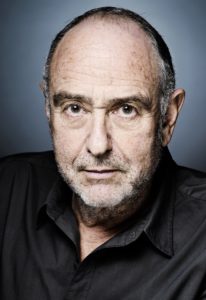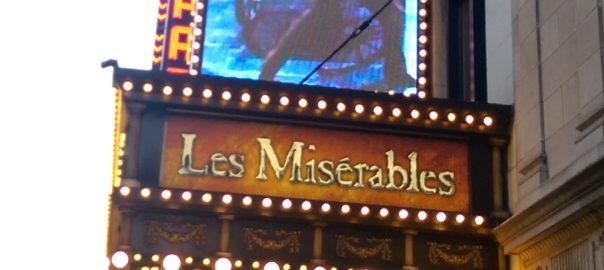A gripping tale of love, conscience, sacrifice and redemption, Victor Hugo’s timeless “Les Misérables” has been made into a movie more than 50 times, including a forthcoming BBC mini-series. But this universal story might be best known through the award-winning stage musical by Alain Boublil and Claude-Michel Schönberg.
Schönberg and Boublil will be artists-in-residence at the University of Virginia from Feb. 22 to 24, sharing their experience and creative insights with students, faculty, staff and the Charlottesville community. The residency is funded by the Arts Endowment, a permanent endowment established in 2014 dedicated to expanding, improving and promoting excellence in the arts at the University through investments in new and signature arts programs that enhance the University and the student experience.
As part of the residency, the University will offer an exclusive screening of the recent London stage production, “Miss Saigon: The 25th Anniversary Performance courtesy of Universal Pictures, UPHE Content Group.” The screening includes a special finale, with the 25th Anniversary cast joined on stage by original cast members Jonathan Pryce, Lea Salonga and Simon Bowman. The screening will take place at Newcomb Hall Theatre at 7:00 p.m. on Wednesday, Feb. 22, with a brief introduction by creators Alain Boublil and Claude-Michel Schönberg.


Photo by Daniela Beltran.
Two free conversations will also be open to the public.
On Feb. 23 at 6:30 p.m. in Old Cabell Hall Auditorium, Schönberg and Boublil will talk with Marva, a professor emeritus who formerly taught in UVA’s Departments of French and Drama. The discussion will cover their careers, musical theater today and their current and future projects. The evening also will feature the University Singers led by director Michael Slon and guest artists performing several Boublil and Schönberg songs from “Les Misérables” and “Miss Saigon.”
On Feb. 24 at 4 p.m. in the Ruth Caplin Theatre, Boublil and Schönberg will share with Department of Drama chair Colleen Kelly their insights about theatrical creations and performances.
Tickets for these events are available at the UVA Box Office, limited to two for each patron.
While at UVA, Schönberg and Boublil will conduct workshops with students and faculty members and discuss their composition and libretto-writing experiences and musical theater careers.
“There will be a variety of conversations with the students – all the way from details about how the musical came to fruition, to acting in musical theater, to songwriting, mostly in English, but also in French,” Barnett said. “Claude-Michel has told me several times that they come to UVA ‘for the students.’”
As part of the residency, the University will screen the 10th-anniversary “Dream Cast” production of “Les Misérables” on Feb. 26.

Photo by Marva Barnett
Lyricist Boublil and composer Schönberg’s “Les Mis” opened in Paris in 1980, and then became a smash hit on the London stage in 1985. Seen by more than 70 million people in 42 countries and 22 different languages, the musical has received more than 140 major theater awards and is still on stage after 35 years.
Their “Miss Saigon,” first performed in London in 1989 and on Broadway in 1991, will again come to Broadway on March 1 following a successful London revival. Schönberg said he was inspired to retell Puccini’s “Madame Butterfly” when he happened to see a photograph of a Vietnamese mother leaving her child at the Tan Son Nhut Air Base – the “ultimate sacrifice,” Schönberg thought, of giving up her daughter so that her American ex-G.I. father could give her a better life.
Schönberg – a record producer, actor, singer, songwriter and musical theater and ballet composer – is best known for his collaborations with Boublil, a musical theater lyricist and librettist, author and producer. Their other major works together include the rock opera “La Révolution Française” (1973), “Martin Guerre” (1996), “The Pirate Queen” (2006) and “Marguerite” (2008). Schonberg’s shows have won many awards over the years, most recently the WhatsonStage audience awards for Best West End Show and Best Musical Revival for the new London production of “Miss Saigon,” which opened in 2014. A Golden Globe winner, Oscar nominee and Grammy award winner, Schönberg has been appointed visiting professor of contemporary theater at St. Catherine’s College, Oxford University – a position funded by the Mackintosh Foundation.
Boublil’s many awards include two Tonys, two Grammys, two Victoire de la Musique and a Molière Award for “Les Misérables” as well as an Evening Standard Drama Award for “Miss Saigon,” a Laurence Olivier Award for “Martin Guerre” and a New York Chapter Honors Grammy for his outstanding contribution to the creative community. He co-wrote the screenplay of the Golden Globe-winning and Oscar-nominated film, “Les Misérables.” Currently he is working with Schönberg on a revised version of “Martin Guerre.” He is also working on a symphonic concert and an animated project of their first rock opera, “The French Revolution.”
Schönberg and Alain Boublil were honored in May at a New York Pops gala concert in Carnegie Hall, celebrating their 40-year collaboration.
Marva Barnett’s primary research centers on Hugo. She edited “Victor Hugo on Things That Matter,” a reader that highlights Hugo’s ideas and their contemporary relevance, and this spring teaches a first-year University Seminar “Les Misérables Today,” in which students will explore why the novel and musical resonate so much with so many people today.
“When I first met Claude-Michel and told him that I had taught Hugo’s novel in conjunction with the musical several times, he asked whether I would like him to come to UVA,” Barnett said. “He then invited Alain Boublil to join him.”
The visit is co-sponsored by the Office of the Provost, the Vice Provost for the Arts, the Department of Drama and the Department of Music.
By Caroline Newman, University News Associate, Office of University Communications, U. of Virginia, cfn8m@virginia.edu
Originally posted at https://news.virginia.edu/content/award-winning-les-miserables-creators-be-artists-residence-uva

 Broadway, January 2015
Photo by Marva Barnett
Broadway, January 2015
Photo by Marva Barnett 